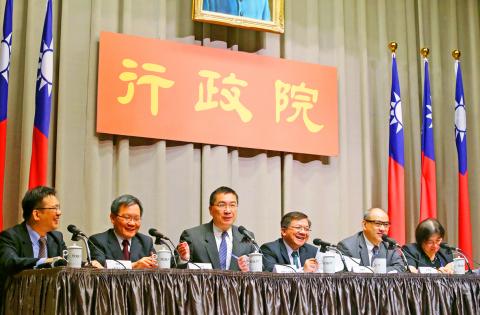The Cabinet yesterday approved a draft bill relaxing the restrictions on foreign white-collar workers in a bid to attract skilled foreigners for the government’s “Asian Silicon Valley” initiative.
The draft bill would relax the regulatory constraints on residence and work permits, taxation, internships, healthcare and retirement benefits.
The bill is aimed at attracting three categories of workers: general specialists, including freelance workers, artists and teachers; specialists of designated fields, including science, economics, education, culture, sports and others; and senior specialists, including highly skilled professionals, university professors, Olympic medalists and coaches of national sports teams.

Photo: CNA
An “employment gold card” — a four-in-one residence and work permit that consists of a resident visa, an alien resident certificate, a re-entry permit and a work permit that allows foreign workers to transition between jobs without their employer’s consent — would be given to foreign specialists.
The act would also extend the residency period for foreign employees from three to five years and scrap a regulation requiring workers with permanent residency to stay in Taiwan for at least 183 days every year.
A one-year resident visa would be offered to the family members of foreign workers, while children of holders of an alien permanent resident certificate would be allowed to work in Taiwan.
The spouse and children of foreign workers with an alien permanent resident certificate would also be able to apply for the certificate.
Workers with an alien permanent resident certificate would also be eligible to receive monthly pension payments. The spouse and underage children of a foreign worker would be allowed join the National Health Insurance (NHI) program without having to wait for six months.
Specialists of designated fields with an annual salary of more than NT$2 million (US$65,772) would be eligible for a three-year 50 percent tax exemption on their wages.
Visa regulations would be relaxed for students and college graduates seeking internship in Taiwan.
Foreigners seeking to work in Taiwan under the act must either have work experiences with a monthly salary of more than NT$47,971 or have a degree from one of the world’s top 500 universities.
“The key to pushing ahead with the ‘Asian Silicon Valley’ project is to attract top foreign talent and build a creative environment for Taiwanese,” Premier Lin Chuan (林全) said.
In a bid to build an ecosystem for technology start-ups, the National Development Council, in addition to preparing the draft act, has a budget of NT$100 billion to help Taiwanese industries transition to Internet of Things technologies, augmented and virtual reality technologies, artificial intelligence, self-driving car technologies and medical care.

ENDEAVOR MANTA: The ship is programmed to automatically return to its designated home port and would self-destruct if seized by another party The Endeavor Manta, Taiwan’s first military-specification uncrewed surface vehicle (USV) tailor-made to operate in the Taiwan Strait in a bid to bolster the nation’s asymmetric combat capabilities made its first appearance at Kaohsiung’s Singda Harbor yesterday. Taking inspiration from Ukraine’s navy, which is using USVs to force Russia’s Black Sea fleet to take shelter within its own ports, CSBC Taiwan (台灣國際造船) established a research and development unit on USVs last year, CSBC chairman Huang Cheng-hung (黃正弘) said. With the exception of the satellite guidance system and the outboard motors — which were purchased from foreign companies that were not affiliated with Chinese-funded

PERMIT REVOKED: The influencer at a news conference said the National Immigration Agency was infringing on human rights and persecuting Chinese spouses Chinese influencer “Yaya in Taiwan” (亞亞在台灣) yesterday evening voluntarily left Taiwan, despite saying yesterday morning that she had “no intention” of leaving after her residence permit was revoked over her comments on Taiwan being “unified” with China by military force. The Ministry of the Interior yesterday had said that it could forcibly deport the influencer at midnight, but was considering taking a more flexible approach and beginning procedures this morning. The influencer, whose given name is Liu Zhenya (劉振亞), departed on a 8:45pm flight from Taipei International Airport (Songshan airport) to Fuzhou, China. Liu held a news conference at the airport at 7pm,

AIR SUPPORT: The Ministry of National Defense thanked the US for the delivery, adding that it was an indicator of the White House’s commitment to the Taiwan Relations Act Deputy Minister of National Defense Po Horng-huei (柏鴻輝) and Representative to the US Alexander Yui on Friday attended a delivery ceremony for the first of Taiwan’s long-awaited 66 F-16C/D Block 70 jets at a Lockheed Martin Corp factory in Greenville, South Carolina. “We are so proud to be the global home of the F-16 and to support Taiwan’s air defense capabilities,” US Representative William Timmons wrote on X, alongside a photograph of Taiwanese and US officials at the event. The F-16C/D Block 70 jets Taiwan ordered have the same capabilities as aircraft that had been upgraded to F-16Vs. The batch of Lockheed Martin

GRIDLOCK: The National Fire Agency’s Special Search and Rescue team is on standby to travel to the countries to help out with the rescue effort A powerful earthquake rocked Myanmar and neighboring Thailand yesterday, killing at least three people in Bangkok and burying dozens when a high-rise building under construction collapsed. Footage shared on social media from Myanmar’s second-largest city showed widespread destruction, raising fears that many were trapped under the rubble or killed. The magnitude 7.7 earthquake, with an epicenter near Mandalay in Myanmar, struck at midday and was followed by a strong magnitude 6.4 aftershock. The extent of death, injury and destruction — especially in Myanmar, which is embroiled in a civil war and where information is tightly controlled at the best of times —